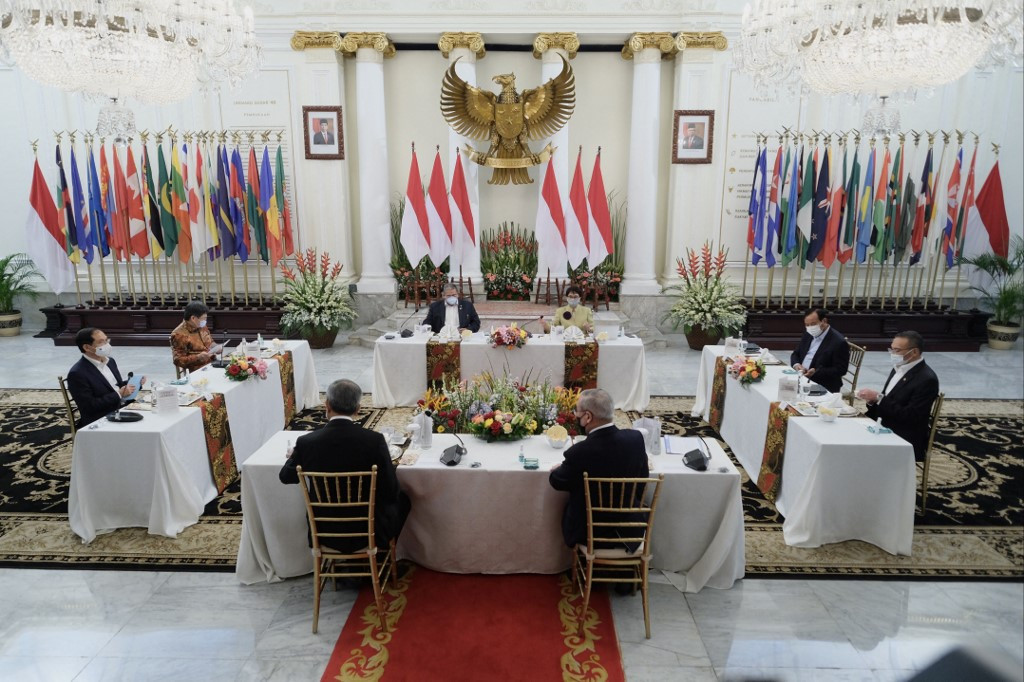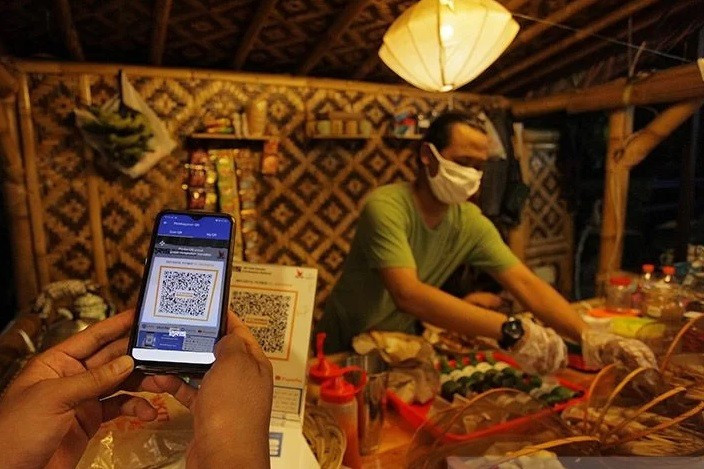Popular Reads
Top Results
Can't find what you're looking for?
View all search resultsPopular Reads
Top Results
Can't find what you're looking for?
View all search resultsMyanmar’s junta backed into corner?
The Tatmadaw, the powerful but shadowy military force, which has controlled the country on and off since 1962, confronts what could be a situation roughly similar to Syria a decade ago.
Change text size
Gift Premium Articles
to Anyone
 This handout photo taken on April 23, 2021 and released by the Indonesian Foreign Ministry shows Indonesian Foreign Minister Retno Marsudi (top centre R) attending an informal dinner with her Association of Southeast Asian Nations (ASEAN) counterparts in Jakarta, ahead of the ASEAN summit on the Myanmar crisis. (AFP/Handout)
This handout photo taken on April 23, 2021 and released by the Indonesian Foreign Ministry shows Indonesian Foreign Minister Retno Marsudi (top centre R) attending an informal dinner with her Association of Southeast Asian Nations (ASEAN) counterparts in Jakarta, ahead of the ASEAN summit on the Myanmar crisis. (AFP/Handout)
A
s events in Myanmar continue to spiral into a dangerous descent of bloody civil conflict this strategic Southeast Asian nation has nearly reached a tipping point. Diplomacy is needed to defuse the crisis before it spins out of control with unpredictable consequences.
Amid this sense of urgency, the 10-member ASEAN has called for “an immediate end to the violence,” which had jolted Myanmar since the February military coup. ASEAN a largely economic grouping of regional states, nonetheless is challenged to play a political role here to stop the spread of violence.
In a meeting in Jakarta, the ASEAN group reached consensus and pressed Myanmar’s military leader Gen. Min Aung Hliang to stop the violence, release political prisoners, and open the country to humanitarian aid. Indonesia’s President Joko “Jokowi” Widodo implored, “Violence must be stopped. Democracy, stability and peace in Myanmar must return immediately. The interests of Myanmar’s people must be a priority.”
Indonesia, a regional powerhouse along with Singapore and Malaysia have pushed for a wider role to stop the crisis in Myanmar which has seen more than 730 killed by the military junta.
Malaysia moreover advanced a plan including deescalation of violence on the ground and an end to killing and violence against civilians.
But Thailand, a key country bordering Myanmar and having extensive commercial ties with the resource rich country, was notable by its absence at the ASEAN meeting. Why? Thailand is itself ruled by a military regime and not anxious to rock the political boat.
Many observers no longer see the traditional military coup which quickly establishes control after a spasm of shocking of brute force. Now rather a sustained social media energized opposition from emboldened civil society as well as Myanmar’s ethnic separatist armies all seem to oppose the coup.
The Tatmadaw, the powerful but shadowy military force, which has controlled the country on and off since 1962, confronts what could be a situation roughly similar to Syria a decade ago where a powerful regime was challenged by a growing insurrection unleashing a civilian bloodbath and refugee outflow. Such a confrontation in beleaguered Myanmar is becoming possible as violence has not abated.
Sadly the UN Security Council has long been deadlocked on the Myanmar crisis and thus has not been able to exercise its mandate. As late as 2009 China and Russia used a rare double
Veto to stop a human rights resolution sponsored by United States and United Kingdom. Recent Security Council attempts to revive a Myanmar peace process have fallen on fallow ground.
That may be one reason why UN Secretary-General Antonio Guterres stated, “Today, ASEAN’s role is more crucial than ever as the region faces an urgent crisis in Myanmar.” He added, that the UN’s special envoy for Myanmar stood ready to resume dialogue with the junta and
“to contribute to a return of Myanmar to the democratic paths and to peace and stability.”
Since the military coup Myanmar’s popular democratically elected leader Aung San Su Kyi has been arrested and the parliament suspended. In the meantime a kind of “shadow government,” known as the National Unity Government said ASEAN’s statement was “encouraging news.” The democratic dissidents added, “We look forward to firm action by ASEAN to follow up its decisions and restore our democracy and freedom.”
Returning to the Syria style scenario for a moment let’s look at what can happen.
In 2017, the Myanmar government (then still led by civilians) began a systematic plan to expel members of the Muslim minority from the largely Buddhist country. Over 800,000 Rohingya were displaced and still largely live in squalid camps in neighboring Bangladesh.
Myanmar’s population of 54 million is roughly double Syria’s. Now imagine if the civil conflict expands; will large flows of refugees, many of them ethnic minorities flee Myanmar into neighboring Thailand or India creating a humanitarian catastrophe?
Equally will an armed insurgency inside Myanmar expand seeing serious clashes between the opposition and the military?
It’s time for Myanmar to step back from the brink.
***
The writer is a United Nations correspondent covering diplomatic and defense issues, and the author of Divided Dynamism: The Diplomacy of Separated Nations: Germany, Korea, China.









